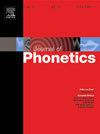Relative importance of stress correlates in native listeners’ identification of Spanish lexical stress produced by monolingual and bilingual speakers
IF 2.4
1区 文学
0 LANGUAGE & LINGUISTICS
引用次数: 0
Abstract
Spanish has many minimal stress pairs, and lexical stress in Spanish is marked primarily via suprasegmental cues. Thus, sensitivity to suprasegmental information is crucial for spoken-word identification in Spanish. Using stimuli produced by speakers of Mexican Spanish with varying language learning experience (i.e., monolingual speakers, heritage speakers, L2 learners), this study examines native listeners’ identification of Spanish lexical stress under enhanced variability in phonetic cues. Our data demonstrate that listeners exploit various stress correlates in the speech signal and assign different weights to them, which is context-specific; when there is a pitch accent, native listeners mainly attend to f0-related cues, whereas in the absence of a pitch accent, intensity plays a stronger role. Our data also show that clustering based on stress correlates is not consistent with the predetermined monolingual-heritage-L2 group division, which indicates that language learning experience alone is not sufficient to explain how Spanish speakers mark stress. This study highlights the importance of incorporating variable speech data in speech perception research and adopting a data-driven, individual-centered approach to speaker grouping in cross-sectional studies.
重音的相对重要性与母语听者对单语和双语者所产生的西班牙语词汇重音的识别相关
西班牙语有许多最小重音对,西班牙语的词汇重音主要是通过超分段线索来标记的。因此,对超分词信息的敏感性对西班牙语口语单词识别至关重要。本研究使用具有不同语言学习经验的墨西哥西班牙语使用者(即单语使用者、传统使用者、第二语言学习者)产生的刺激,研究母语听者在语音线索增强变化的情况下对西班牙语词汇重音的识别。我们的数据表明,听者利用语音信号中的各种重音关联,并赋予它们不同的权重,这是特定于上下文的;当有音高重音时,母语听众主要关注的是60个相关线索,而在没有音高重音时,强度起着更大的作用。我们的数据还显示,基于重音相关性的聚类与预先确定的单语传承-第二语言群体划分不一致,这表明语言学习经验本身不足以解释西班牙语使用者如何标记重音。本研究强调了在语音感知研究中纳入可变语音数据以及在横断面研究中采用数据驱动、以个体为中心的方法对说话人分组的重要性。
本文章由计算机程序翻译,如有差异,请以英文原文为准。
求助全文
约1分钟内获得全文
求助全文
来源期刊

Journal of Phonetics
Multiple-
CiteScore
3.50
自引率
26.30%
发文量
49
期刊介绍:
The Journal of Phonetics publishes papers of an experimental or theoretical nature that deal with phonetic aspects of language and linguistic communication processes. Papers dealing with technological and/or pathological topics, or papers of an interdisciplinary nature are also suitable, provided that linguistic-phonetic principles underlie the work reported. Regular articles, review articles, and letters to the editor are published. Themed issues are also published, devoted entirely to a specific subject of interest within the field of phonetics.
 求助内容:
求助内容: 应助结果提醒方式:
应助结果提醒方式:


